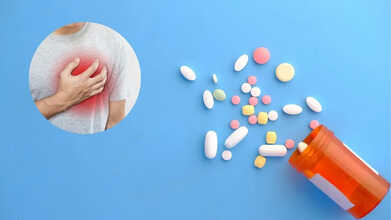- Health Conditions A-Z
- Health & Wellness
- Nutrition
- Fitness
- Health News
- Ayurveda
- Videos
- Medicine A-Z
- Parenting
- Web Stories
10 Sleep Truth That May Be Holding You Back From Proper Rest, Sleep Doctor Reveal Harsh Sleep Truths

(Credit-Canva)
A major part of your health depends on your sleep. While you may delay your sleep or skip it to do other tasks, your body keeps the score. You may be slowly pushing yourself into not just physical health issues, but also mental health issues.
While sleep may seem like an easy thing, you only need enough time for there are many aspects of it that could reveal whether you are sleeping well or not. In a recent post, Dr Christopher J Allen, MD, a US board-certified sleep doctor, revealed 10 important sleep facts that one must know.
Sleep Advice You Need For Proper Rest
In the video titled, “Advice I’d give you as a sleep doctor for a decade – If I wasn’t afraid of hurting your feelings” he gave the below mentioned advice.
Snoozing Doesn't Help
Hitting the snooze button actually confuses your brain. It starts a new sleep cycle that you immediately interrupt. This guarantees you will feel more groggy and tired all morning, not rested. Just get up when the alarm first rings.
Late-Night Energy Isn't Natural
Feeling "wired" late at night isn't natural energy. It usually means you've had too much stimulation, you're dehydrated, and you're stuck in a constant stress cycle. Your body is running on high alert, not true fuel.
Instant Sleep Isn't Healthy
If you fall asleep the second your head hits the pillow, you don't have great sleep; you have a problem. It's a clear sign of severe exhaustion or a major sleep debt built up from missing sleep over time.
You Need Recovery, Not Stimulants
Your constant low energy can't be fixed by simply drinking more caffeine. Your real issue is a lack of proper recovery. You need more REM sleep—the deep, restorative kind—to truly solve your energy problem.
Midnight Waking Is Stress-Related
Waking up sharply at 3 AM is not random bad luck. It often happens because your stress hormones, called cortisol, start pumping during the night. Your body is on high alert, starting its "night shift" while you should be resting.
Scrolling Isn't Relaxing
You think you're relaxing when you scroll through your phone, but your nervous system disagrees. The bright screen and constant stimulation signal danger to your brain, putting you into survival mode instead of calming you down.
Weekend Catch-Up Doesn't Work
Trying to "catch up" on sleep during the weekend doesn't fix your sleep debt. It simply throws off your body's internal clock (circadian rhythm). This actually makes it much harder to wake up and start your week on Monday.
You Can't 'Get Used To' 5 Hours
Science shows that believing you are "used to" only five hours of sleep is dangerous. Your body is actually quietly suffering damage and breaking down. You need more sleep to avoid long-term health risks.
Tiredness Starts Before Bed
Waking up feeling completely exhausted isn't usually your mattress's fault. It’s often connected to your stress mindset, the food you eat, and those sneaky stress hormone spikes that happen while you should be deeply sleeping.
Most Important Factor For Sleep
The health expert ended the post by explaining your body can't truly heal and recover if you keep it in the same environment and under the same stress that makes you feel run down. Your bedroom and your nightly routine are actually a direct reflection of your entire lifestyle.
The core scientific truth is that your body isn't being lazy, it is genuinely exhausted, and your brain isn't broken, it's just begging for the safety and security that comes from good, proper rest.
Common Painkiller Tramadol Found Ineffective For Chronic Pain, May Trigger THIS Serious Health Risk

Credits: Canva
Tramadol, a strong synthetic opioid, has been commonly prescribed for moderate to severe pain. However, a recent study suggests that its risks may outweigh its modest benefits for chronic pain, and its use should be carefully reconsidered. Published in the journal BMJ Evidence-Based Medicine, the study found that tramadol may offer only a slight reduction in chronic pain, with limited evidence supporting its effectiveness.
More worryingly, it could contribute to long-term health problems that might become life-threatening. Let’s examine the study’s findings in detail.
What Is Tramadol Used For?
Tramadol is a prescription, only synthetic opioid used to manage moderate to severe pain. It works by changing how the brain and nervous system perceive pain, according to Medline Plus. Its uses include:
- Acute pain: Immediate-release formulations help manage short-term, intense pain, such as after surgery or an injury.
- Chronic pain: Extended-release tablets and capsules are used for persistent, severe pain when other treatments have failed.
- Condition-specific pain: It may be prescribed for ongoing pain from conditions such as osteoarthritis, fibromyalgia, and neuropathic pain.
Tramadol Can Lead To Serious Health Issues?
A new review suggests that millions of Americans with chronic pain may be prescribed tramadol, a drug that may provide minimal relief. Even more concerning, the research highlights that the medication could increase the risk of serious health complications, including heart disease, the leading cause of death in the US.
According to the Centers for Disease Control and Prevention, about 51.6 million adults in the US, roughly one in five, experience chronic pain, with 17.1 million having pain that interferes with daily life or work. Tramadol has often been used to manage this pain, with 16 million prescriptions written for the drug in 2023 alone. Traditionally seen as a “safer alternative” to stronger opioids, tramadol has been perceived to carry fewer side effects and a lower risk of addiction.
Given conflicting evidence from earlier limited studies, Danish researchers decided to evaluate whether tramadol is truly effective and safe for chronic pain. “The findings suggest that the benefits of tramadol are questionable or uncertain. Additionally, there is evidence of potentially harmful effects,” said Dr. Janus Jakobsen, lead author and clinical professor at the University of Southern Denmark.
Tramadol Side Effects
Tramadol can cause serious side effects, including heart-related issues such as chest pain, heart disease, or congestive heart failure. The study also found it increased the risk of both mild and serious adverse events, including nausea, dizziness, constipation, drowsiness, and cardiac complications. It may also be linked to neoplasm events, abnormal cell growths that can lead to tumors, which may be benign or malignant.
These findings, published in BMJ Evidence-Based Medicine, arrive amid the ongoing opioid crisis in the US, which has claimed hundreds of thousands of lives since the late 1990s. Research indicates that around 12% of patients treated with opioids for chronic pain may develop addiction or misuse the drugs, raising the risk of overdose and other severe outcomes.
The opioid epidemic was declared a national public health emergency by President Trump in 2017, and the death toll has continued to rise in the years since.
Feeling Anxious Lately? Experts Reveal How It Might Be Affecting Your Blood Pressure

Credits: Canva
According to India’s National Mental Health Survey, nearly 3.5% of the country’s population experiences anxiety disorders each year, often triggered by work stress, relationship problems, or distressing events. While mild anxiety is a normal part of life, persistent or unmanaged anxiety can keep older adults in a constant state of tension.
This long-term stress may increase heart rate, affect mood, and, as experts now warn, even raise blood pressure (BP). The American Psychological Association (APA) defines anxiety as ongoing feelings of worry or unease that can cause physical reactions such as a faster heartbeat or sweating.
The APA also notes that anxiety can temporarily elevate blood pressure. In turn, people with chronic high blood pressure, or hypertension, may develop anxiety about their health, creating a cycle where each condition worsens the other.
Can Anxiety Lead To Blood Pressure?
Anxiety is the body’s built-in response to stress. It’s common to feel anxious before a major exam or while awaiting important news. When this happens, the body releases stress hormones that raise the heart rate and narrow blood vessels, both of which can push blood pressure higher.
A 2015 study by Medical News Today found that individuals with severe anxiety faced a greater risk of developing hypertension compared to those with milder symptoms. Researchers emphasized the importance of early diagnosis and treatment of anxiety, especially for people who already have high blood pressure.
In most cases, anxiety-related spikes in blood pressure are short-lived and return to normal once the person calms down. However, constant anxiety can strain the heart, kidneys, and blood vessels much like long-term hypertension does. Over time, hormonal changes linked to anxiety may lead to fat accumulation, especially around the waist. Anxiety can also alter daily habits, such as causing stress eating, which may indirectly raise blood pressure.
Signs of Anxiety-Induced High Blood Pressure
A normal blood pressure reading typically falls between 90/60 mmHg and 120/80 mmHg. For adults over 80, readings below 150/90 mmHg are considered healthy. When readings consistently rise above these levels, it can indicate hypertension. Some anxiety medications can also increase blood pressure. For example, serotonin and noradrenaline reuptake inhibitors (SNRIs), commonly used to treat anxiety disorders, are known to cause a rise in BP. Common symptoms of anxiety that may contribute to higher blood pressure include:
- Trembling or shaking
- Excessive sweating
- Chest pain
- Headaches
- Nausea or stomach discomfort
- Irritability
- Dizziness or shortness of breath
Can High Blood Pressure Also Trigger Anxiety?
High blood pressure itself can sometimes lead to feelings of anxiety. People diagnosed with hypertension may start worrying about their long-term health or potential complications. The symptoms of hypertension, such as headaches, vision problems, or an irregular heartbeat can also cause distress or panic. According to Medical News Today, signs of hypertension can include:
- Vision changes
- Headaches
- Irregular heart rhythm
- Buzzing in the ears
Severe hypertension can also provoke anxiety. If someone feels unusually anxious and experiences symptoms like headaches or shortness of breath, it is important to seek immediate medical help.
Since hypertension often develops without clear warning signs, it can be difficult to tell whether the cause of discomfort is anxiety or high blood pressure. This is why regular check-ups with a doctor are essential for monitoring and managing both conditions effectively.
Popular Cough Syrup 'Coldrif' Banned For Kids In Several Indian States Due To Presence Of DEG; Why Is It Alarming?

Credits: Canva
The Union Health Ministry has confirmed that a batch of Coldrif cough syrup made at a Tamil Nadu facility contained diethylene glycol (DEG) beyond safe limits. Earlier samples collected in Madhya Pradesh tested negative, but contamination was detected when Tamil Nadu authorities examined the products directly at Sresan Pharma in Kanchipuram.
Several states have now banned the syrup, and the Centre has ordered inspections at 19 pharmaceutical units across six states, the Ministry of Health and Family Welfare (MoHFW) said in an official statement on October 5. But what exactly is diethylene glycol, and should you be concerned?
Diethylene Glycol Found In ‘Coldrif’ Cough Syrup
Some children with routine cold symptoms such as cough, fever, and mild discomfort were prescribed the locally available Coldrif syrup. Instead of getting better, within a few days, some developed dark urine, extreme fatigue, and signs of kidney failure, as per BBC.
Death reports are also surfacing, with the toll rising. The Tamil Nadu government has issued a notice to Sresan Pharma, asking why its drug license should not be revoked after 14 children in Madhya Pradesh reportedly died from consuming this toxic syrup. The governments of Madhya Pradesh, Uttar Pradesh, and Tamil Nadu have banned Coldrif sales after tests revealed it contained a highly poisonous chemical. The health ministry confirmed that the syrup contained diethylene glycol (DEG), an industrial solvent, which can be fatal even in small doses.
What Is Diethylene Glycol?
According to the World Health Organization (WHO), diethylene glycol (DEG) and ethylene glycol (EG) are industrial chemicals used in antifreeze, paints, brake fluids, and plastics. They are not intended for medicinal use but can enter drugs if contaminated or if industrial-grade raw materials are used instead of pharmaceutical grade ingredients such as glycerine or propylene glycol.
Once consumed, DEG and EG break down into toxic compounds that can harm the kidneys, liver, and nervous system. Tamil Nadu drug officials found that Coldrif contained 48.6% DEG, which is far above safe limits. The Centre has initiated inspections at 19 pharmaceutical units in six states, filed FIRs, and taken regulatory action in multiple regions.
Several children remain hospitalized across states after consuming the syrup. Doctors are providing treatments including dialysis, but they warn that affected children may continue to experience long-term kidney and nerve problems.
How To Know If You Have Been Contaminated With Diethylene Glycol?
Cases of DEG contamination are emerging daily, mostly in children who developed acute kidney issues after taking cough syrup. Common warning signs include:
- Nausea
- Vomiting
- Abdominal pain
- Drowsiness
- Reduced urination
In children, poisoning can escalate quickly to acute kidney failure, seizures, and even death.
Is It Safe To Consume Cough Syrup?
Interestingly, the batch of Coldrif syrup made by Sresan Pharma (Tamil Nadu) tested positive for high DEG levels (48.6%) at the manufacturing site, triggering bans in Madhya Pradesh, Tamil Nadu, and possibly other states. At the same time, samples collected from other locations, such as in MP and Rajasthan, did not always show contamination, suggesting limited batch issues or testing differences. However, to minimize the risk:
- Always follow your doctor’s or pharmacist’s instructions regarding dose and duration.
- Prefer single-ingredient formulations over combinations to reduce the chance of overexposure.
- Avoid expired syrups or those from unreliable sources.
- Seek medical help if symptoms persist instead of increasing the dose yourself.
- Store medicines correctly according to label instructions (temperature, humidity, etc.).
India is the world’s largest producer of generic medicines, often called the “pharmacy of the world.” Incidents like this raise serious public health concerns and could impact India’s global pharmaceutical reputation.
© 2024 Bennett, Coleman & Company Limited

